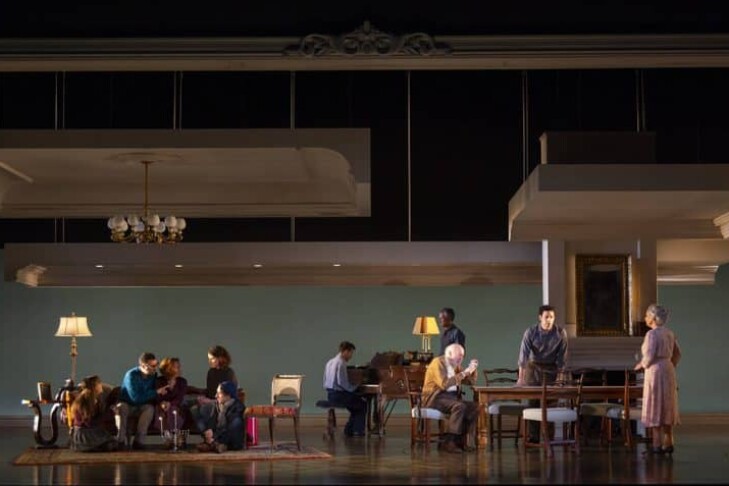Every now and then, a play smacks so hard of reality and truth that you walk out of the theater in a daze and then find yourself thinking about it for weeks afterward.
That was the case for me after my family ventured into Boston to see the Huntington Theatre’s production of “Prayer for the French Republic,” which is set to begin previews on Broadway in December. And, sadly, the horrific events of Oct. 7 in Israel have only intensified the antisemitism made vivid in the play.
Written by Joshua Harmon, the play is set in the Paris apartment of the Salomon family. Most of the action takes place during 2016-2017, but the audience also gets frequent glimpses back in time to the 1940s, when the previous generation of Salomons faced the consequences of the Nazi invasion of France.
In the more recent, 2016–2017-timeframe, we meet the elderly father, Pierre Salomon, who manages a store that sell pianos and has been in their family for five generations. Marcelle, Pierre’s daughter, is a physician and the mother of two grown children, Joshua and Elodie, who still live with her and her husband, Charles, in the apartment where she and her brother, Patrick, grew up.
The play’s action begins with Marcelle’s welcoming a distant American cousin, Molly, who is studying abroad in France. They are interrupted when Joshua bursts into the apartment, bloodied by attackers who targeted him—and not for the first time—because he was wearing a kippah (skull cap).
Each member of the Salomon family reacts to the attack in his or her own way. Marcelle insists that Joshua needs to begin wearing a baseball cap to cover his kippah, while Charles announces that the family must flee France and move to Israel to be safe—just as his family had left Algeria for France in the 1950s.
As the family members argue about whether, given the virulent antisemitism, the country the Salomon family has loved for generations is still safe for them, the play affords the audience opportunities to understand the situation from multiple viewpoints. We see how the harrowing fates of family members during the war in the 1940s set the stage, so to speak, for the subsequent generations of that same family. We face the fact that the current targeting of Jews is reminiscent of what Jews have faced throughout the ages all around the world.
Although the play is a work of fiction, the story captures the existential fears of Jews living in modern-day France. The number of Jews leaving France to immigrate to Israel has escalated markedly since the 2015 murderous attacks at the office of the political magazine Charlie Hebdo and the kosher supermarket Hyper Cacher.
France is certainly not alone in experiencing an alarming rise in antisemitic acts in recent years. The Anti-Defamation League (ADL) has tracked almost 3,700 antisemitic incidents in the U.S. in 2022, a 6% increase from the previous year and the highest number since the ADL began keeping records. At the same time, the ADL’s 2023 report, “Antisemitic Attitudes in America,” found that 20% of Americans believe six or more antisemitic tropes. That number is likely to have skyrocketed in the period following Oct. 7, 2023.
On a personal level, all three of my children have attended Boston-area schools at which antisemitic acts have occurred. With the ADL finding that one in five Americans holds antisemitic beliefs, the Salomon family’s fictional crisis in France feels disturbingly relatable to what is happening where I live, in New England, where reports of assault, harassment and vandalism against Jews rose 42% in 2022. (Of the 158 incidents reported in New England, 108 were in Massachusetts alone, according to an ADL report.)
At a time when antisemitic acts are on the rise throughout the world, the need for education and understanding is critical. Works of art, such as this play, help to make the struggle personal and relatable. Although my family has felt relatively safe, I think we would all agree that, at times, we worry, and that we often feel guarded about our identity as Jews.
Support for organizations that expose and counter antisemitism is vital to reversing the uptick in hateful acts toward Jews. The ADL and Holocaust museums around the world deserve help and praise for continuing to educate and shed light on the issue.
Hadassah, the largest Jewish women’s organization in America and the country’s largest Zionist organization, has mobilized its nearly 300,000 members in the fight against antisemitism, addressing the issue nationally, regionally and locally. Being part of an organization that is actively addressing antisemitic incidents and threats helps me to feel less alone and personally targeted, as I felt so many years ago, when, after learning I was Jewish, my third-grade teacher asked me to show my horns to my class.
This post has been contributed by a third party. The opinions, facts and any media content are presented solely by the author, and JewishBoston assumes no responsibility for them. Want to add your voice to the conversation? Publish your own post here. MORE



